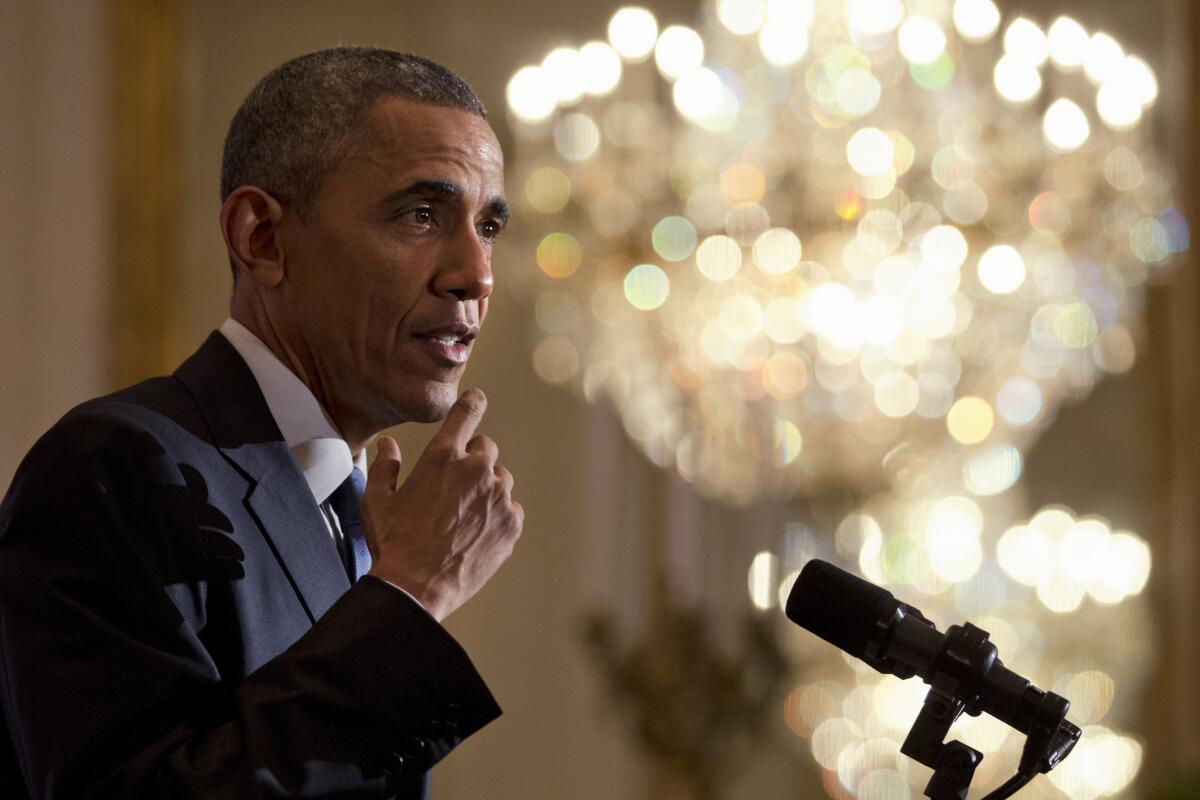Obama says Netanyahu’s comment complicates goal of Israel-Palestinian peace

- Share via
Reporting From Washington — Israeli Prime Minister Benjamin Netanyahu’s comments before his reelection last week were divisive and make it harder to find a path forward toward peace talks between Israeli and Palestinian leaders, President Obama said in an interview published Saturday.
Obama ratcheted up his confrontation with Netanyahu at the end of a week that saw relations between the U.S. and Israel hit a low. Earlier in the week, as voters headed to the polls in Israel, Netanyahu said he would oppose creating a Palestinian state, reversing his earlier position that a two-state solution was possible under certain conditions.
His comment, which he sought to back off from after the election, provoked a strong response from the Obama administration, which said the U.S. would “reassess” its policies on Israel, including reconsidering whether to continue shielding its historically close Mideast ally from international pressure in the United Nations. And during a phone conversation Thursday, Obama told Netanyahu that he had set back efforts to move forward on a Middle East peace deal.
“I indicated to him that given his statements prior to the election, it is going to be hard to find a path where people are seriously believing that negotiations are possible,” Obama said during a Friday interview with the Huffington Post, which was published Saturday.
In addition, Obama said that Israel’s continued expansion of settlements is “not a recipe for stability in the region,” and that the U.S. would continue to insist in its conversations with Israeli leaders that the “status quo is unsustainable.”
Obama and Netanyahu have never been close, though they are in contact frequently, and their relationship appeared to be further strained by another comment the Israeli leader made on election day.
Netanyahu urged his supporters to vote because Arabs were heading to the polls “in droves,” a warning that many saw as racist.
Obama said in the interview that it was “contrary to what is the best of Israel’s traditions.”
“Although Israel was founded based on the historic Jewish homeland and the need to have a Jewish homeland, Israeli democracy has been premised on everybody in the country being treated equally and fairly. And I think that that is what’s best about Israeli democracy,” Obama said.
“If that is lost, then I think that not only does it give ammunition to folks who don’t believe in a Jewish state, but it also, I think, starts to erode the name of democracy in the country.”
After winning reelection, Netanyahu told U.S. television journalists that he hadn’t changed his policy on a Palestinian state and that he meant only that such an entity wasn’t possible under current conditions.
He said he still supports a deal that would include a demilitarized Palestinian state with a leadership that recognizes Israel as a Jewish state, a position he staked out in 2009.
He also said he didn’t mean to sound discriminatory against Arab voters.
But Obama said that Netanyahu’s comments before the polls closing have prompted U.S. policymakers to take a new look at U.S.-Israeli relations.
“We take him at his word when he said that it wouldn’t happen during his prime ministership, and so that’s why we’ve got to evaluate what other options are available to make sure that we don’t see a chaotic situation in the region,” Obama said.
The two leaders have also been at loggerheads over efforts among the U.S. and five other world powers to broker an agreement with Iran on its nuclear program. House Republicans inflamed tension between Obama and Netanyahu when they broke diplomatic protocol and invited Netanyahu to address Congress directly without consulting the White House. Netanyahu used the speech in early March to warn that a deal would threaten Israel’s existence.
Twitter: @ByBrianBennett
More to Read
Sign up for Essential California
The most important California stories and recommendations in your inbox every morning.
You may occasionally receive promotional content from the Los Angeles Times.














